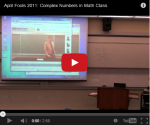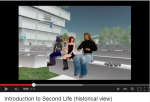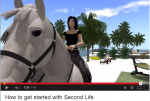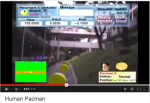VirtualMV/Multimedia/Theory/Definitions/Content
From WikiEducator
< VirtualMV | Multimedia | Theory | Definitions
Contents
Definitions
Multimedia
- A variety of resources that can be used to communicate information, a concept or knowledge.
- This can include people, things or computer based elements such as text, images, animation, sound and video.
Computer based multimedia
- The use of a computer
- to present and combine text, graphics, sound, animation and video
- in an electronic publication
- with links and tools
- that let the user navigate, interact, create and communicate. (Hofsetter, F. T., (2001) Multimedia Literacy.)
Interactive Computer based multimedia
- The additional features of providing user interaction.
- Examples include
- Forms that allow user data to be entered
- Searching features
- On-line testing
- Applets such as calculators
- Interactive eBooks
- Games
- Interactive Multimedia
YouTube: 2011 April Fools Math Class
2011 April Fools Math Class (Takes a lot of preparation and practice)
Virtual Reality Multimedia
YouTube: 2006 Introduction to Second Life (historical view)
A video explaining many of the features available in Second Life (a historical view)
YouTube: How to get started in Second life 2013
A quick video on setting up Second Life
Mixed/Augmented reality multimedia
- Various sensors capture contextual information and make the environments smart.
- For example, location sensors attached to objects or persons identify and record the location of the object or person, and sound recorders analyze the mood of a person.
- E.g. Google goggles, XBox connect, Sony Playstation - Move
YouTube: 2006 Demo video of the Human Pacman project
A video from 2006 of the Human Pacman project from the Mixed Reality Lab at the National University of Singapore
Connected Media
- Connected media does not contain interaction; instead content items are nodes in a network of connections that are the focus of interaction. The content is inside-out. The hot content today is not interactive - Flickr/Photobucket, YouTube, iTunes, RSS feeds all feature non-interactive, yet highly connected via layers of interlinked metadata (del.icio.us, technorati, recommendations, hyperlinks, comments...)
- Google maps is used extensively by motel/hotel web pages.(e.g. http://www.maisonbearnaise.co.nz/contact.htm )
- "the nature of content itself is changing. HyperCard, Flash, and the like are indeed tools of interactive media. However, interactive multimedia is no longer in fashion (who needs a "next page" button in a piece of content when we have ubiquitous hypertext? Why embed the movie in Flash when I can just link to YouTube?)"
- Scott Wilson in JISC CETIS EC SIG (2007-02-26) citing "inspired by Derrick de Kerckhove's book 'Connected Intelligence'".
- Read wiki page Connected Media
Social multimedia Computing (MIC)
- Multimedia resources and applications designed to be disseminated through social interaction or be used to capture social activity and interaction. Tian, Srivastava, Huang, and Contractor (2010)[1] characterise MIC by three forms of interaction:
- Content interaction between multimedia: E.g. Flickr image and tags (not necessarily created at the same time)
- Social interaction around multimedia. For example, Tagged images, video blogs.
- Social interaction captured in multimedia. For example, video surveillance.
- Vialogues (Video + Dialogue)
- Online video with group discussion feature time stamped to the video
- Example: A Dialogue on Vialogues Note the time line on the right of the page and the discussion. Also the second comment displays a question/response comment
Multimedia for different users
- Computer gamers
- nVidia graphics accelerator card, Pentium IV, Sidewinder force feed joystick
- Internet surfers
- Real audio and MPEG players
- Teachers & Students
- CD based maps, videos and encyclopedias
- Home users
- Digital cameras, scanners and colour printers
- Graphics designers and artists
- Photo-quality printers and high resolution digital cameras.
Cite error: <ref> tags exist, but no <references/> tag was found



